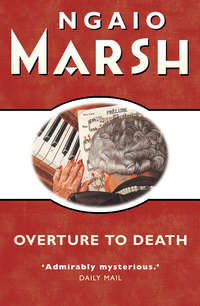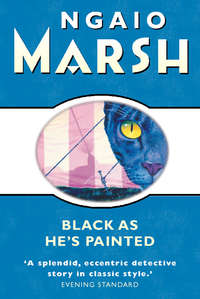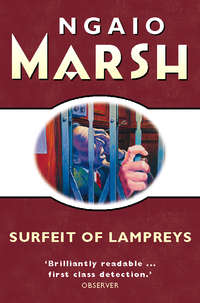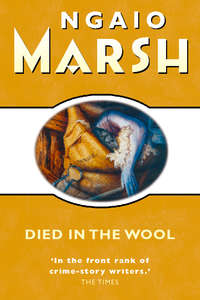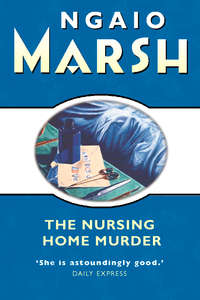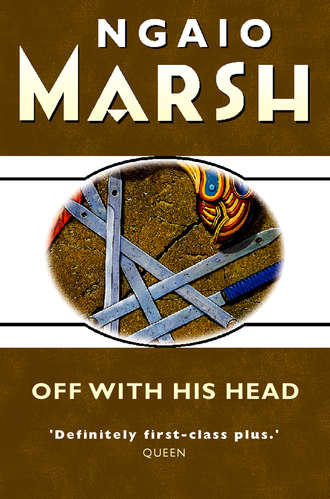
Полная версия
Off With His Head
‘Us reckoned you’d be too mighty for your mother’s folk.’
Camilla told herself that she would speak very quietly because she didn’t want the invisible Mrs Bünz to hear. Even so, her little speech sounded like a bit of diction exercise. But she couldn’t help that.
‘I’m an Andersen as much as I’m a Campion, Grandfather. Any “mightiness” has been on your side, not my father’s or mine. We’ve always wanted to be friends.’
‘Plain to see you’re as deadly self-willed and upperty as your mother before you,’ he said, blinking at her. ‘I’ll say that for you.’
‘I am very like her, aren’t I? Growing more so, Daddy says.’ She turned to her uncles and went on, a little desperately, with her prepared speech. It sounded, she thought, quite awful. ‘We’ve only met once before, haven’t we? At my mother’s funeral. I’m not sure if I know which is which, even.’ Here, poor Camilla stopped, hoping that they might perhaps tell her. But they only shuffled their feet and made noises in their throats. She took a deep breath and went on. (‘Voice pitched too high,’ she thought.) ‘May I try and guess? You’re the eldest, You’re my Uncle Dan, aren’t you, and you’re a widower with a son. And there are Andy and Nat, the twins. You’re both married but I don’t know what families you’ve got. And then came Mummy. And then you, Uncle Chris, the one she liked so much, and I don’t know if you’re married.’
Chris, the ruddy one, looked quickly at Trixie, turned the colour of his own hair and shook his head.
‘And I’ve already met Uncle Ernie,’ Camilla ended, and heard her voice fade uneasily.
There seemed little more to say. It had been a struggle to say as much as that. There they were with their countrymen’s clothes and boots, their labourers’ bodies and their apparent unreadiness to ease a situation that they themselves, or the old man, at least, had brought about.
‘Us didn’t reckon you’d carry our names so ready,’ Dan said and smiled at her again.
‘Oh,’ Camilla cried, seizing at this, ‘that was easy. Mummy used to tell me I could always remember your names in order because they spelt DANCE: Dan, Andy, Nat, Chris, Ernie. She said she thought Grandfather might have named you that way because of Sword Wednesday and the Dance of the Five Sons. Did you, Grandfather?’
In the inglenook of the Private, Mrs Bünz, her cider half-way to her lips, was held in ecstatic suspension.
A slightly less truculent look appeared in old William’s face.
‘That’s not a maid’s business,’ he said. ‘It’s man’s gear, that is.’
‘I know. She told me. But we can look on, can’t we? Will the swords be out on the Wednesday after the 21st, Grandfather?’
‘Certain sure they’ll be out.’
‘I be Whiffler,’ Ernie said very loudly. ‘Bean’t I, chaps?’
‘Hold your noise then. Us all knows you be Whiffler,’ said his father irritably, ‘and going in mortal dread of our lives on account of it.’
‘And the Wing-Commander’s “Crack”,’ Ernie said monotonously pursuing his theme. ‘Wing-Commander Begg, that is. Old ’Oss, that is. ’E commanded my crowd ’e did: I was ’is servant, I was. Wing-Commander Simon Begg, only we called ’im Simmy-Dick, we did. ’E’ll be Old ’Oss, ’e will.’
‘Ya-a-as, ya-a-as,’ said his four brothers soothingly in unison. Ernie’s dog came out from behind the door and gloomily contemplated its master.
‘We can’t have that poor stinking beast in here,’ Trixie remarked.
‘Not healthy,’ Tom Plowman said. ‘Sorry, Ern, but there you are. Not healthy.’
‘No more ’tis,’ Andy agreed. ‘Send it back home, Ern.’
His father loudly ordered the dog to be removed, going so far as to say that it ought to be put out of its misery, in which opinion his sons heartily concurred. The effect of this pronouncement upon Ernie was disturbing. He turned sheet-white, snatched up the dog and, looking from one to the other of his relations, backed towards the door.
‘I’ll be the cold death of any one of you that tries,’ he said violently.
A stillness fell upon the company. Ernie blundered out into the dark, carrying his dog.
His brothers scraped their boots on the floor and cleared their throats. His father said: ‘Damned young fool, when all’s said.’ Trixie explained that she was as fond of animals as anybody but you had to draw the line.
Presently Ernie returned, alone, and after eyeing his father for some moments, began to complain like a child.
‘A chap bean’t let ’ave nothin’ he sets his fancy to,’ Ernie whined. ‘Nor let do nothin’ he’s a notion to do. Take my case. Can’t ’ave me dog. Can’t do Fool’s act in the Five Sons. I’m the best lepper and caperer of the lot of you. I’d be a proper good Fool, I would.’ He pointed to his father. ‘You’re altogether beyond it, as the doctor in ’is wisdom ’as laid down. Why can’t you heed ’im and let me take over?’
His father rejoined with some heat: ‘You’re lucky to whiffle. Hold your tongue and don’t meddle in what you don’t understand. Which reminds me,’ he added, advancing upon Trixie. ‘There was a foreign wumman up along to Copse Forge. Proper old nosey besom. If so be – Ar?’
Camilla had tugged at his coat and was gesturing in the direction of the hidden Mrs Bünz. Trixie mouthed distractedly. The four senior brothers made unhappy noises in their throats.
‘In parlour, is she?’ William bawled. ‘Is she biding?’
‘A few days,’ Trixie murmured. Her father said firmly: ‘Don’t talk so loud, Guiser.’
‘I’ll talk as loud as I’m minded. Us doan’t want no furreignesses hereabouts –’
‘Doan’t, then Dad,’ his sons urged him.
But greatly inflamed, the Guiser roared on. Camilla looked through into the Private and saw Mrs Bünz wearing an expression of artificial abstraction. She tiptoed past the gap and disappeared.
‘Grandfather!’ Camilla cried out indignantly, ‘she heard you! How could you! You’ve hurt her feelings dreadfully and she’s not even English –’
‘Hold your tongue, then.’
‘I don’t see why I should.’
Ernie astonished them all by bursting into shouts of laughter.
‘Like mother, like maid,’ he said, jerking his thumb at Camilla. ‘Hark to our Bessie’s girl.’
Old William glowered at his granddaughter. ‘Bad blood,’ he said darkly.
‘Nonsense! You’re behaving,’ Camilla recklessly continued, ‘exactly like an over-played “heavy”. Absolute ham, if you don’t mind my saying so, Grandather!’
‘What kind of loose talk’s that?’
‘Theatre slang, actually.’
‘Theatre!’ he roared. ‘Doan’t tell me you’re shaming your sex by taking up with that trash. That’s the devil’s counting-house, that is.’
‘With respect, Grandfather, it’s nothing of the sort.’
‘My granddaughter!’ William said, himself with considerable histrionic effort, ‘a play-actress! Ar, well! Us might have expected it, seeing she was nossled at the breast of the Scarlet Woman.’
Nat and Andy with the occasional unanimity of twins groaned: ‘Ar, dear!’
The landlord said: ‘Steady, souls.’
‘I really don’t know what you mean by that,’ Camilla said hotly. ‘If you’re talking about Daddy’s Church you must know jolly well that it isn’t mine. He and Mummy laid that on before I was born. I wasn’t to be a Roman and if my brother had lived he would have been one. I’m C. of E.’
‘That’s next door as bad,’ William shouted. ‘Turning your back on Chapel and canoodling with Popery.’
He had come quite close to her. His face was scored with exasperation. He pouted, too, pushing out his lips at her and making a piping sound behind them.
To her own astonishment Camilla said: ‘No, honestly! You’re nothing but an old baby after all,’ and suddenly kissed him.
‘There now!’ Trixie ejaculated, clapping her hands.
Tom Plowman said: ‘Reckon that calls for one all round on the house.’
The outside door was pushed open and a tall man in a duffle coat came in.
‘Good evening, Mr Begg,’ said Trixie.
‘How’s Trix?’ asked Wing-Commander Simon Begg.
II
Later on, when she had seen more of him, Camilla was to think of the first remark she heard Simon Begg make as completely typical of him. He was the sort of man who has a talent for discovering the Christian names of waiters and waitresses and uses them continually. He was powerfully built and not ill-looking, with large blue eyes, longish hair and a blond moustache. He wore an RAF tie, and a vast woollen scarf in the same colours. He had achieved distinction (she was to discover) as a bomber pilot during the war.
The elder Andersens, slow to recover from Camilla’s kiss, greeted Begg confusedly, but Ernie laughed with pleasure and threw him a crashing salute. Begg clapped him on the shoulder. ‘How’s the corporal?’ he said. ‘Sharpening up the old whiffler, what?’
‘Crikey!’ Camilla thought, ‘he isn’t half a cup of tea, is the Wing-Commander.’ He gave her a glance for which the word ‘practised’ seemed to be appropriate and ordered his drink.
‘Quite a party tonight,’ he said.
‘Celebration, too,’ Trixie rejoined. ‘Here’s the Guiser’s granddaughter come to see us after five years.’
‘No!’ he exclaimed. ‘Guiser! Introduce me, please.’
After a fashion old William did so. It was clear that for all his affectation of astonishment, Begg had heard about Camilla. He began to ask her questions that contrived to suggest that they belonged to the same world. Did she by any chance know a little spot called ‘Phipps’ near Shepherd’s Market – quite a bright little spot, really. Camilla, to whom he seemed almost elderly, thought that somehow he was also pathetic. She felt she was a failure with him and decided that she ought to slip away from the Public where she now seemed out of place. Before she could do so, however, there was a further arrival: a pleasant-looking elderly man in an old-fashioned covert-coat with a professional air about him.
There was a chorus of ‘Evenin’, Doctor.’ The newcomer at once advanced upon Camilla and said: ‘Why, bless my soul, there’s no need to tell me who this is: I’m Henry Otterly, child. I ushered your mama into the world. Last time I spoke to her she was about your age and as like as could be. How very nice to see you.’
They shook hands warmly. Camilla remembered that five years ago when a famous specialist had taken his tactful leave of her mother, she had whispered: ‘All the same, you couldn’t beat Dr Otterly up to Mardian.’ When she had died, they carried her back to Mardian and Dr Otterly had spoken gently to Camilla and her father.
She smiled gratefully at him now and his hand tightened for a moment round hers.
‘What a lucky chap you are, Guiser,’ said Dr Otterley: ‘with a granddaughter to put a bit of warmth into your Decembers. Wish I could say as much for myself. Are you staying for Christmas, Miss Camilla?’
‘For the Winter Solstice anyway,’ she said. ‘I want to see the swords come out.’
‘Aha! So you know all about that.’
‘Mummy told me.’
‘I’ll be bound she did. I didn’t imagine you people nowadays had much time for ritual dancing. Too “folksy”– is that the word? – or “artsy-craftsy” or “chi-chi”. No?’
‘Ah no! Not the genuine article like this one,’ Camilla protested. ‘And I’m sort of specially interested because I’m working at a drama school.’
‘Are you now?’
Dr Otterly glanced at the Andersens but they were involved in a close discussion with Simon Begg. ‘And what does the Guiser say to that?’ he asked and winked at Camilla.
‘He’s livid.’
‘Ha! And what do you propose to do about it? Defy him?’
Camilla said: ‘Do you know, I honestly didn’t think anybody was left who thought like he does about the theatre. He quite pitched into me. Rather frightening when you come to think of it.’
‘Frightening? Ah!’ Dr Otterly said quickly. ‘You don’t really mean that. That’s contemporary slang, I dare say. What did you say to the Guiser?’
‘Well, I didn’t quite like,’ Camilla confided, ‘to point out that after all he plays the lead in a pagan ritual that is probably chock full of improprieties if he only knew it.’
‘No,’ agreed Dr Otterly drily, ‘I shouldn’t tell him that if I were you. As a matter of fact, he’s a silly old fellow to do it at all at his time of life. Working himself into a fizz and taxing his ticker up to the danger-mark. I’ve told him so but I might as well speak to the cat. Now, what do you hope to do, child? What rôles do you dream of playing? Um?’
‘Oh, Shakespeare if I could. If only I could.’
‘I wonder. In ten years’ time? Not the giantesses, I fancy. Not the Lady M. nor yet The Serpent of Old Nile. But a Viola, now, or – what do you say to a Cordelia?’
‘Cordelia?’ Camilla echoed doubtfully. She didn’t think all that much of Cordelia.
Dr Otterly contemplated her with evident amusement and adopted an air of cosy conspiracy.
‘Shall I tell you something? Something that to me at least is immensely exciting? I believe I have made a really significant discovery: really significant about – you’d never guess – about Lear. There now!’ cried Dr Otterly with the infatuated glee of a White Knight. ‘What do you say to that?’
‘A discovery?’
‘About King Lear. And I have been led to it, I may tell you, through playing the fiddle once a year for thirty years at the Winter Solstice on Sword Wednesday for our Dance of the Five Sons.’
‘Honestly?’
‘As honest as the day. And do you want to know what my discovery is?’
‘Indeed I do.’
‘In a nutshell, this; here, my girl, in our Five Sons is nothing more nor less than a variant of the Basic Theme: Frazer’s theme: The King of the Wood, The Green Man, The Fool, The Old Man Persecuted by his Young: the theme, by gum, that reached its full stupendous blossoming in Lear. Do you know the play?’ Dr Otterly demanded.
‘Pretty well, I think.’
‘Good. Turn it over in your mind when you’ve seen the Five Sons, and if I’m right you’d better treat that old grandpapa of yours with respect, because on Sword Wednesday, child, he’ll be playing what I take to be the original version of King Lear. There now!’
Dr Otterly smiled, gave Camilla a little pat and made a general announcement.
‘If you fellows want to practise,’ he shouted, ‘you’ll have to do it now. I can’t give you more than half an hour. Mary Yeoville’s in labour.’
‘Where’s Mr Ralph?’ Dan asked.
‘He rang up to say he might be late. Doesn’t matter, really. The Betty’s a freelance after all. Everyone else is here. My fiddle’s in the car.’
‘Come on, then, chaps,’ said old William. ‘Into the barn.’ He had turned away and taken up a sacking bundle when he evidently remembered his granddaughter.
‘If you bean’t too proud,’ he said, glowering at her, ‘you can come and have a tell up to Copse Forge tomorrow.’
‘I’d love to. Thank you, Grandfather. Good luck to the rehearsal.’
‘What sort of outlandish word’s that? We’re going to practise.’
‘Same thing. May I watch?’
‘You can not. ’Tis men’s work, and no female shall have part nor passel in it.’
‘Just too bad,’ said Begg, ‘isn’t it, Miss Campion? I think we ought to jolly well make an exception in this case.’
‘No. No!’ Camilla cried, ‘I was only being facetious. It’s all right, Grandfather. Sorry. I wouldn’t dream of butting in.’
‘Doan’t go nourishing and ’citing thik old besom, neither.’
‘No, no, I promise. Goodnight, everybody.’
‘Goodnight, Cordelia,’ said Dr Otterly.
The door swung to behind the men. Camilla said goodnight to the Plowmans and climbed up to her room. Tom Plowman went out to the kitchen.
Trixie, left alone, moved round into the bar-parlour to tidy it up. She saw the envelope that Camilla in the excitement of opening her letter had let fall.
Trixie picked it up and, in doing so, caught sight of the superscription. For a moment she stood very still, looking at it. The tip of her tongue appearing between her teeth as if she thought to herself: ‘This is tricky.’ Then she gave a rich chuckle, crumpled the envelope and pitched it into the fire. She heard the door of the Public Bar open and returned there to find Ralph Stayne staring unhappily at her.
‘Trixie –’
‘I reckin,’ Trixie said, ‘you’m thinking you’ve got yourself into a terrible old pickle.’
‘Look – Trixie –’
‘Be off,’ she said.
‘All right. I’m sorry.’
He turned away and was arrested by her voice, mocking him.
‘I will say, however, that if she takes you, she’ll get a proper man.’
III
In the disused barn behind the pub, Dr Otterly’s fiddle gave out a tune as old as the English calendar. Deceptively simple, it bounced and twiddled, insistent in its reiterated demand that whoever heard it should feel in some measure the impulse to jump.
Here, five men jumped: cleverly, with concentration and variety. For one dance they had bells clamped to their thick legs and, as they capered and tramped, the bells jerked positively with an overtone of irrelevant tinkling. For another, they were linked, as befitted the sons of a blacksmith, by steel: by a ring made of five swords. They pranced and leapt over their swords. They wove and unwove a concentric pattern. Their boots banged down to the fiddle’s rhythm and with each down-thump a cloud of dust was bumped up from the floor. The men’s faces were blank with concentration: Dan’s, Andy’s, Nat’s, Chris’s and Ernie’s. On the perimeter of the figure and moving round it danced the Old Guiser, William Andersen. On his head was a rabbit-skin cap. He carried the classic stick-and-bladder. He didn’t dance with the vigour of his sons but with dedication. He made curious, untheatrical gestures that seemed to have some kind of significance. He also chided his sons and sometimes called them to a halt in order to do so.
Independent of the Guiser but also moving as an eccentric satellite to the dance was ‘Crack’, the Hobby Horse, with Wing-Commander Begg inside him. ‘Crack’ had been hammered out at Copse Forge, how many centuries ago none of the dancers could tell. His iron head, more bird-like than equine, was daubed with paint after the fashion of a witch-doctor’s mask. It appeared through a great, flat, drumlike body: a circular frame that was covered to the ground with canvas and had a tiny horsehair tail stuck through it. ‘Crack’ snapped his iron jaws and executed a solo dance of some intricacy.
Presently Ralph Stayne came in, shaking the snow off his hat and coat. He stood watching for a minute or two and then went to a corner of the barn where he found, and put on, a battered crinoline-like skirt. It was enormously wide and reached to the floor.
Now, in the character of the man-woman, and wearing a face of thunder, Ralph, too, began to skip and march about the Dance of the Five Sons. They had formed the Knot or Glass – an emblem made by the interlacing of their swords. Dan and Andy displayed it, the Guiser approached, seemed to look in it at his reflection and then dashed it to the ground. The dance was repeated and the knot reformed. The Guiser mimed, with clumsy and rudimentary gestures, an appeal to the clemency of the Sons. He appeared to write and show his will, promising this to one and that to another. They seemed to be mollified. A third time they danced and formed their knot. Now, mimed old William, there is no escape. He put his head in the knot. The swords were disengaged with a clash. He dropped his rabbit cap and fell to the ground.
Dr Otterly lowered his fiddle.
‘Sorry,’ he said. ‘I must be off. Quite enough anyway for you, Guiser. If I knew my duty I wouldn’t let you do it at all. Look at you, you old fool, puffing like your own bellows. There’s no need, what’s more, for you to extend yourself like that. Yours is not strictly a dancing role. Now, don’t go on after I’ve left. Sit down and play for the others if you like. Here’s the fiddle. But no more dancing, understand? ’Night, boys.’
He shrugged himself into his coat and went out. They heard him drive away.
Ernie practised ‘whiffling’. He executed great leaps, slashing with his sword at imaginary enemies and making a little boy’s spaceman noise between his teeth. The Hobby Horse performed an extraordinary and rather alarming antic which turned out merely to be the preparatory manœuvre of Simon Begg divesting himself of his trappings.
‘Damned if I put this bloody harness on again tonight,’ he said. ‘It cuts my shoulders and it stinks.’
‘So does the Betty,’ said Ralph. ‘They must have been great sweaters, our predecessors. However: toujours l’art, I suppose.’
‘Anything against having them washed, Guiser?’ asked Begg.
‘You can’t wash Old ’Oss,’ the Guiser pointed out. ‘Polish iron and leather and hot up your pail of pitch. Dip Crack’s skirt into it last thing as is what is proper and right. Nothin’ like hot pitch to smell.’
‘True,’ Ralph said: ‘you have the advantage of me, Begg. I can’t turn the Betty into a tar-baby, worse luck.’
Begg said: ‘I’d almost forgotten the hot pitch. Queer sort of caper when you come to think of it. Chasing the lovely ladies and dabbing hot tar on ’em. Funny thing is, they don’t run away as fast as all that, either.’
‘Padstow ’Oss,’ observed Chris, ‘or so I’ve ’eard tell, catches ’em up and overlays ’em like a candle-snuff.’
‘’Eathen licentiousness,’ rejoined his father, ‘and no gear for us chaps, so doan’t you think of trying it on, Simmy-Dick.’
‘Guiser,’ Ralph said, ‘you’re superb. Isn’t the whole thing heathen?’
‘No, it bean’t then. It’s right and proper when it’s done proper and proper done by us it’s going to be.’
‘All the same,’ Simon Begg said, ‘I wouldn’t mind twenty seconds under the old tar barrel with that very snappy little job you introduced to us tonight, Guiser.’
Ernie guffawed and was instantly slapped down by his father. ‘You hold your noise. No way to conduct yourself when the maid’s your niece. You should be all fiery hot in ’er defence.’
‘Yes, indeed,’ Ralph said quietly.
Begg looked curiously at him. ‘Sorry, old man,’ he said. ‘No offence. Only a passing thought and all that. Let’s change the subject: when are you going to let us have that smithy, Guiser?’
‘Never. And you might as well make up your mind to it. Never.’
‘Obstinate old dog, isn’t he?’ Begg said at large.
Dan, Chris and the twins glanced uncomfortably at their father.
Dan said: ‘Us chaps are favourably disposed as we’ve mentioned, Simmy-Dick, but, the Dad won’t listen to us, no more than to you.’
‘Look, Dad,’ Chris said earnestly, ‘it’d be in the family still. We know there’s a main road going through in the near future. We know a service station’d be a little gold mine yur on the cross-roads. We know the company’d be behind us. I’ve seen the letters that’s been wrote. We can still have the smithy. Simmy-Dick can run the servicing side on his own to begin with. Ernie can help. Look, it’s cast-iron – certain sure.’ He turned to Ralph. ‘Isn’t it? Isn’t it?’
Before Ralph could answer Ernie paused in his whiffling and suddenly roared out, ‘I’d let you ’ave it, Wing-Commander, sir. So I would too.’
The Guiser opened his mouth in anger but, before he could speak, Dan said: ‘We here to practise or not? Come on, chaps. One more dash at the last figure. Strike up for us, Dad.’
The five brothers moved out into the middle of the floor. The Guiser, muttering to himself, laid the fiddle across his knees and scraped a preliminary call-in.
In a moment they were at it again. Down thumped their boots striking at the floor and up bounced the clouds of dust.


